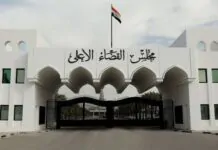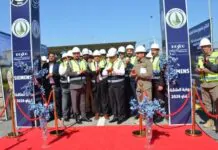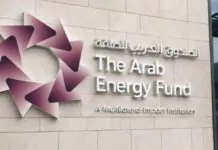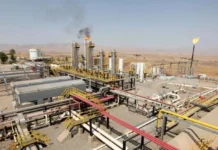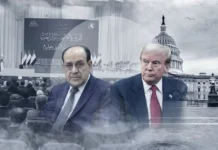Tishwash: Rafidain Bank signs an agreement with an American company in the field of financial consulting and oversight.
Rafidain Bank announced today, Friday, the signing of a professional partnership agreement with an American company in the field of financial consulting and oversight.
Rafidain Bank Director General Ali Karim Hussein Zahir Al-Fatlawi said in a statement published by the Iraqi Embassy in Washington, “In a new strategic step that reflects Iraq’s growing financial standing on the international stage, the Iraqi Embassy in Washington witnessed the signing of a professional partnership agreement between Rafidain Bank and K2 Integrity, a global leader in financial and regulatory consulting.”
He added that “the agreement includes providing a comprehensive package of services, including combating money laundering and terrorist financing, implementing compliance systems in line with international standards, and strengthening the regulatory infrastructure of Iraqi banks.” He noted that “this cooperation is part of the Iraqi government’s strategy to build a strong and transparent financial sector capable of keeping pace with global economic transformations and consolidating Iraq’s position as a promising financial center in the region.”
He explained that “this partnership represents a qualitative leap forward in the path of banking reform,” noting that “the agreement will contribute to strengthening confidence in Iraqi banks and opening broader horizons for cooperation with correspondent banks around the world, supporting the government’s goals of building a strong, transparent financial sector that is consistent with international best practices.”
This signing comes as an extension of the government’s approach to launching strategic projects that enhance Iraq’s position as a promising financial center in the region, and consolidate its image as a country capable of keeping pace with global economic transformations with confidence and competence. link
************
Tishwash: Development Plan 2024–2028: Iraq moves towards a productive economy with revenues exceeding 700 trillion dinars.
In one of the most significant economic transformations in recent years, the Iraqi government has begun implementing the National Development Plan for 2024–2028. The plan aims to transform the national economy by diversifying sources of income and reducing dependence on oil, while also addressing unemployment and boosting investment in vital sectors.
The plan, supported by a clear government vision and political will, includes profound structural reforms and precise performance indicators that are monitored periodically. This comes at a time when projected revenues are estimated at more than 710 trillion Iraqi dinars and investments exceeding 240 trillion dinars are required to achieve its goals.
While the Ministry of Planning emphasized the importance of capital allocation and investment in priority sectors, government agencies viewed the plan as a true economic lever, while economic experts considered it one of the most realistic and comprehensive plans for addressing Iraq’s development challenges.
For his part, the Prime Minister’s Advisor for Financial and Economic Affairs, Mazhar Mohammed Saleh, highlighted the importance of the five-year national development plan for the years 2024–2028.
Speaking to Al-Eqtisad News, Saleh emphasized that the five-year plan reflects a genuine national determination to achieve significant goals in economic progress and prosperity, noting that it relies on population census data to accurately and efficiently guide its implementation.
He added that the plan’s fundamental objective is to implement profound structural reforms, transforming it from a mere written document into an economic lever capable of transforming the production and employment equation and transforming Iraq from a rentier economy to a productive and competitive one, provided it is managed efficiently as a comprehensive national mission.
The advisor pointed out that the success of the five-year plan requires a combination of institutional, financial, and executive components, most notably political will embodied in the government program, with direct support from senior leadership, which has worked to protect planning institutions from fluctuations.
He also stressed the importance of providing a binding legislative and regulatory framework to transform the plan into a law that defines objectives, resources, and responsible parties, in addition to ensuring sustainable and diversified funding consisting of oil revenues, private investments, and soft development loans.
Clear performance indicators and periodic monitoring
Saleh explained that the plan relies on precise governance and continuous monitoring based on key performance indicators (KPIs), which are reviewed semi-annually to ensure commitment and actual implementation of projects.
According to Al-Sudani’s advisor, the most prominent targeted indicators include “annual GDP growth of no less than 5%, an unemployment rate of no more than 8% annually, an inflation rate of no more than 5%, and a petrochemical sector contribution of 5% to GDP.”
He pointed to increasing oil production to 6 million barrels per day, utilizing associated gas by 90%, and increasing the contribution of non-oil sectors to more than 50% of national income. The plan also includes indicators related to the manufacturing, health, education, and infrastructure sectors.
Professional Management and Community Engagement
Saleh added that an important success factor is the formation of specialized implementation teams to manage projects according to international standards (PMI), without quotas or regional distribution. He emphasized the importance of civil society and private sector participation in formulating and implementing the plan, including chambers of commerce and industry and unions.
He concluded by stating that the five-year plan represents a fundamental pillar of sustainable development in Iraq, and requires concerted efforts and genuine national commitment to ensure its transformation into a tangible reality that is reflected in citizens’ living standards and overall economic growth.
In addition, the Ministry of Planning announced that the total revenues expected to be achieved during the five-year development plan period (2024-2028) amount to approximately 710 trillion Iraqi dinars.
The ministry’s official spokesperson, Abdul Zahra Al-Hindawi, told the official agency that the largest portion of these revenues will come from the oil sector, with oil revenues expected to reach approximately 631 trillion dinars, while non-oil revenues are estimated at approximately 79 trillion dinars.
Al-Hindawi added that the five-year plan estimated the volume of investments required to achieve the targeted economic growth rate of 4.24% during its implementation period at more than 241 trillion dinars.
Meanwhile, economic researcher Ali Daadoush asserted that the recently prepared five-year plan is one of the best studies to address the reality of the Iraqi economy, addressing key economic challenges and presenting future investment opportunities to advance the country’s development.
In an interview with Al-Eqtisad News, Daadoush explained that the plan sets ambitious macroeconomic trends, most notably achieving a targeted growth rate of 5% to 6% on an annual average, in addition to targeting natural inflation, stabilizing the exchange rate, and reducing the general budget deficit.
He pointed out that the plan focused on productive sectors, particularly agriculture and food industries, by adopting modern irrigation systems and strategic crops with high water returns, and by establishing specialized logistics and manufacturing zones for dates, grains, poultry, and dairy products, with the aim of enhancing import substitution and increasing local added value.
According to Daadoush, the plan also addressed challenges in other sectors, such as the digital economy, payment systems, and financial sector reform, along with private sector development and increased employment opportunities. A “single window” approach was adopted to remove regulatory barriers (such as licenses, taxes, and industrial land allocation) within a period not exceeding 72 hours, in addition to linking technical education to the needs of priority sectors.
Regarding the components of the plan’s success, the researcher stressed the importance of having clear governance and issuing a playbook for projects that includes the stages of selection, financing, implementation, monitoring, and evaluation, in addition to shifting from item budgets to program and performance budgets, so that each plan includes a program with performance indicators, a direct supervisor, a specific budget, and clear outputs.
Daadoush concluded his remarks by emphasizing the need to enact a law mandating the implementation of the national plan, in conjunction with the general budget and the government program. He considered this tripartite integration to be the cornerstone of sustainable development in Iraq.
The Ministry of Planning believes that the largest share of capital formation will be allocated to the oil sector, at 27.4%, followed by the housing ownership sector, at 22.5%, and then social development services, at 20.8%.
She pointed out that “the water and electricity sector will constitute 8.6% of the total planned capital formation, while the manufacturing sector’s share will be approximately 7.8% link


